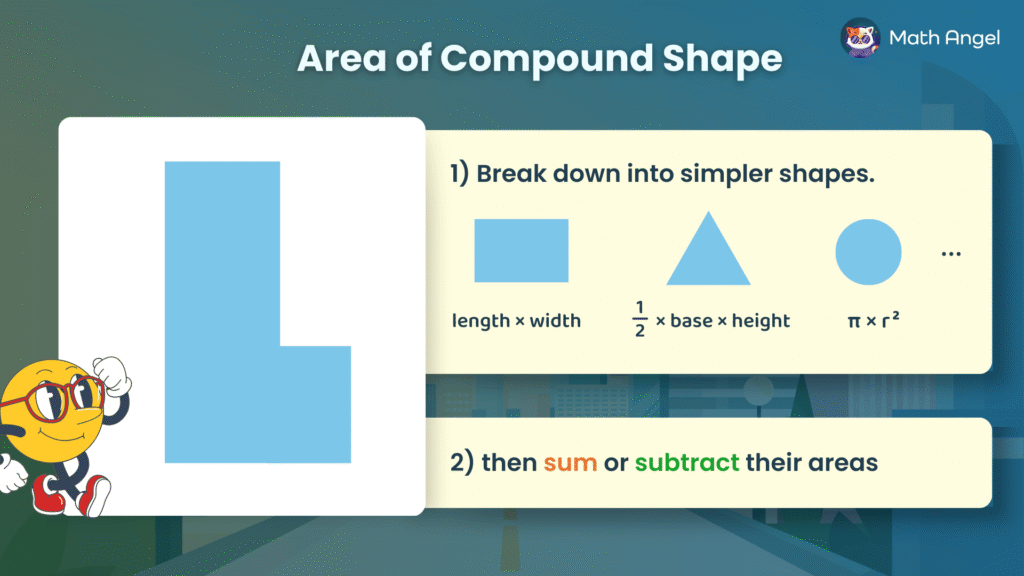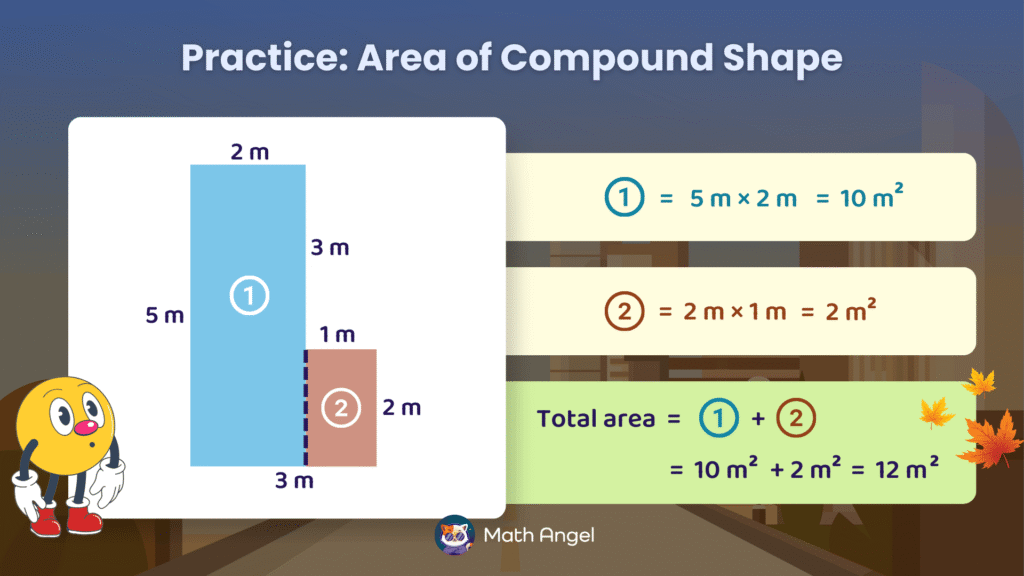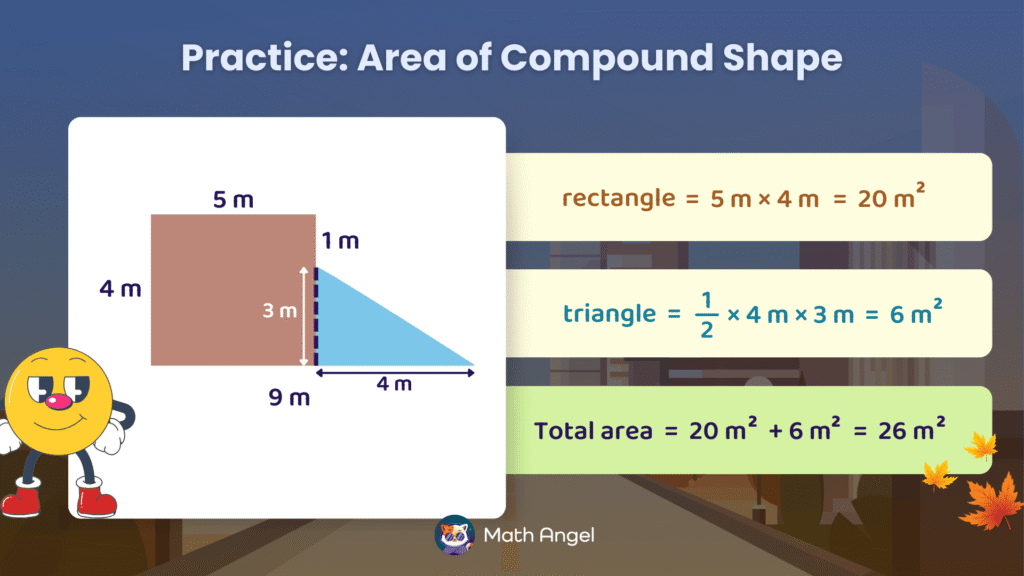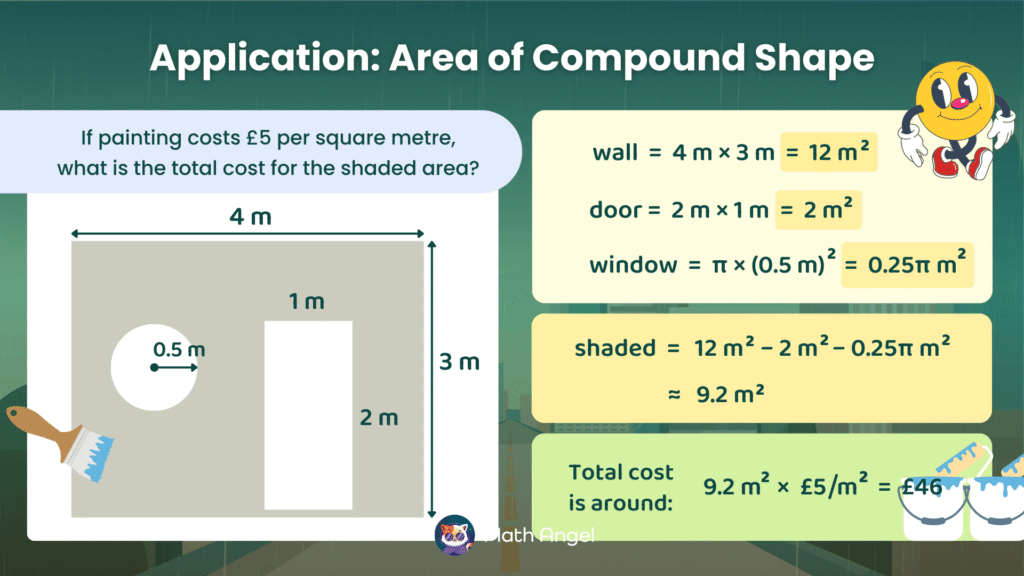Area of Compound Shapes
Table Of Contents
🎬 Math Angel Video: How to Calculate the Area of A Compound Shape
How to Find the Area of a Compound Shape?

⏩️
🛎️ What Is a Compound Shape?
A compound shape is a shape made by joining two or more simple shapes.
To find its total area, follow two steps:
🛎️ Step 1: Break the shape into simpler shapes
Split the compound shape into shapes you already know, such as:
- Rectangle: $\text{Area} = \text{length} \times \text{width}$
- Square: $\text{Area} = \text{side} \times \text{side}$
- Triangle: $ \text{Area} = \tfrac{1}{2} \times \text{base} \times \text{height} $
- Circle: $ \text{Area} = \pi r^2 $
- Semicircle: $ \text{Area} = \tfrac{1}{2} \pi r^2 $
🛎️ Step 2: Add or subtract the areas
- Add the areas when shapes are joined together.
- Subtract an area if a part is missing or cut out.
Finding the Area of a Compound Shape (L-Shape Example)

⏩️
In most cases, you can find the area of a compound shape by splitting it into simpler shapes.
For example, look at this L-shaped figure. To find its area:
🛎️ Step 1: Split the shape
Look at the L-shape. You can draw a line to break it into:
- Rectangle 1 (the tall blue part)
- Rectangle 2 (the small brown part)
🛎️ Step 2: Calculate the areas
Now find the area of each rectangle separately.
- Area of Rectangle 1
Width = 2 m, Height = 5 m
$$\text{Area}_1 = 2\text{ m} \times 5\text{ m} = 10\text{ m}^2$$
- Area of Rectangle 2
Width = 1 m, Height = 2 m
$$\text{Area}_2 = 1\text{ m} \times 2\text{ m} = 2\text{ m}^2$$
🛎️ Step 3: Add the areas
Because these rectangles are joined together, add their areas:
$$\text{Total area} = 10\text{ m}^2 + 2\text{ m}^2 = 12\text{ m}^2$$
❇️ Final Answer: $12\text{ m}^2$
Finding the Area of a Compound Shape (Rectangle + Triangle)

⏩️
🛎️ Step 1: Identify the simple shapes
Look at the diagram. This shape is made from two simple shapes:
- Rectangle (brown)
- Right-angled triangle (blue)
🛎️ Step 2: Area of the rectangle
Width = 5 m, Height = 4 m
$$\text{Rectangle area} = 5 \text{ m} \times 4 \text{ m} = 20 \text{ m}^2$$
🛎️ Step 3: Area of the triangle
Base = 4 m, Height = 3 m
$$\text{Triangle area} = \tfrac{1}{2} \times 4 \text{ m} \times 3 \text{ m} = 6 \text{ m}^2$$
🛎️ Step 4: Add the areas
The triangle is attached to the rectangle, so we add the areas:
$$\text{Total area} = 20 \text{ m}^2 + 6 \text{ m}^2 = 26 \text{ m}^2$$
❇️ Final Answer: $26\text{ m}^2$
Application: Cost of Painting a Wall

⏩️
🚨 Question:
The shaded region is the part to be painted. If painting costs £5 per square metre, what is the total cost for the shaded area of the wall?
❇️ Tip:
The door and window are not painted, so we must subtract their areas.
🛎️ Step 1: Work out the area of the whole wall
The wall is a rectangle:
Width = 4 m, Height = 3 m
$$\text{Wall area} = 4\text{ m} \times 3\text{ m} = 12 \text{ m}^2$$
🛎️ Step 2: Calculate the door area
Width = 1 m, Height = 2 m
$$\text{Door area} = 1\text{ m} \times 2\text{ m} = 2 \text{ m}^2$$
🛎️ Step 3: Calculate the window area
Window is a circle:
Radius = 0.5 m
$$\text{Window area} = \pi \times (0.5\text{ m})^2 = 0.25\pi \text{ m}^2$$
🛎️ Step 4: Find the shaded area by subtracting
$$
\begin{aligned}
\text{Shaded area}
&= 12\text{ m}^2−2\text{ m}^2− 0.25 \pi \text{ m}^2\\[6pt]
&\approx 10\text{ m}^2−0.8\text{ m}^2 \\[6pt]
&\approx 9.2 \text{ m}^2
\end{aligned}
$$
🛎️ Step 5: Calculate the total cost
Painting costs £5 per m²:
$$9.2\text{ m} \times £5 = £46$$
❇️ Final Answer: It will cost about £46 to paint the shaded area.
🎩 Stuck on Area Problems? Ask Our AI Tutor
Need math help? Chat with our AI Math Solver at the bottom right — available 24/7 for instant answers.

